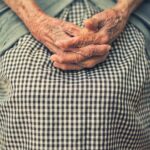Aging & Mental Health
People of all ages are valuable as family, volunteers, and workers, but as we age we may experience physical and mental health challenges such as cognitive decline, depression, and dementia. While most elderly individuals have good mental health, some may face neurological problems, substance abuse, diabetes, hearing loss, and osteoarthritis, and the likelihood of multiple conditions increases with age. Dementia and depression are prevalent among elderly adults, while anxiety disorders impact a smaller but significant percentage. Unfortunately, mental health problems in elderly people are often ignored, misdiagnosed, or unrecognized due to stigma, leading to hesitance in seeking help. The global population is aging rapidly, emphasizing the need to address these challenges.
Potential Risks Associated with Mental Health of Elderly People
Various factors can cause mental health issues for elderly adults. These range from everyday life stressors to reduced mobility, chronic pain, frailty, and other health problems. These can lead to isolation, loneliness, and psychological distress, necessitating long-term care. Moreover, physical health can also factor in mental health issues for elderly adults, as those with heart disease are more likely to be depressed than those in good health. Conversely, mental health problems can also have an adverse effect on physical health if left untreated.
Depression, Dementia & Anxiety Within the Aging Population
Depression, dementia, and anxiety are three common mental health conditions that can have a significant impact on the lives of elderly individuals.
Elderly individuals exhibiting depressive signs experience poorer functioning than those suffering from chronic medical issues such as respiratory illness, hypertension, and diabetes. Depression heightens the sense of poor health, the utilization of health services, and related costs. Depression can be excruciating and can interfere with one’s daily life. Unfortunately, depression is often not diagnosed or treated in primary care settings. Its symptoms are often disregarded or overlooked when they occur alongside other difficulties experienced by older people.
Dementia is a group of neurological disorders characterized by a decline in cognitive functioning. This can include memory loss, difficulty with communication, and impaired problem-solving abilities. Dementia can also lead to changes in behavior and mood. It can significantly impact an individual’s ability to carry out activities of daily living. For elderly individuals, dementia can be particularly challenging, as it can lead to confusion and disorientation and make it difficult to maintain social connections and relationships.
Anxiety is another common condition that can affect the mental health of elderly people. Excessive and persistent worry, fear, or unease characterize anxiety disorders. These feelings can be overwhelming and can interfere with an individual’s ability to carry out daily activities. For elderly individuals, anxiety can be particularly challenging. It can exacerbate existing health conditions, leading to social isolation and reduced quality of life.
Depression, dementia, and anxiety can all have a significant impact on an individual’s overall well-being. It is essential for elderly individuals experiencing these conditions to seek support and treatment from healthcare professionals. This can include medications, therapy, and lifestyle changes, such as exercise and social engagement.
Mental Health Promotion for Elderly Adults
To improve the mental health of older adults, active lifestyle and healthy aging should be encouraged. To promote mental health, it is essential to guarantee that older people have the necessary resources to meet their needs. This includes providing security and freedom, suitable housing through supportive housing policies, social support for older people and their caregivers, and community development programs. One particular way to promote mental health is through physical activity like yoga, which we will further discuss.
How Yoga Can Improve Mental Health of Elderly People
 Health providers must be trained to work with aging-related issues and disorders to promote good general health and social care for older people. Additionally, primary mental health care for older adults at a community level is paramount. Providing long-term care for those aged individuals with mental disorders is essential.
Health providers must be trained to work with aging-related issues and disorders to promote good general health and social care for older people. Additionally, primary mental health care for older adults at a community level is paramount. Providing long-term care for those aged individuals with mental disorders is essential.
An important part of caring for the elderly is including them in programs like yoga classes. Yoga is a practice that integrates the physical, spiritual, and philosophical. It was developed in ancient India and is intended to bring one closer to the divine by unifying their consciousness with the cosmic consciousness. Yoga is a practical, safe, and successful way to practice the relationship between the body and mind. Yoga-based practices integrate physical, cognitive, and emotional elements.
Unsurprisingly, yoga, focusing on breathing exercises and meditation for calming and centering the mind, brings mental benefits like decreased anxiety and depression. When practicing yoga, your brain forms new connections, causing changes in brain structure and function which can benefit those diagnosed with dementia. Additionally, yoga reinforces areas of the brain that are integral for memory, focus, improved learning, thinking, and language. For the elderly population suffering from depression, dementia, anxiety, and other mental conditions, yoga can lead to increased cognitive abilities such as awareness and memory.
Yoga is the most effective complementary therapy for reducing the effect of dementia, depression, and anxiety, likely due to the elevation of GABA levels, which is linked to better mood and decreased anxiety. Compared to traditional remedies such as drugs and talk therapy, this provides a more tempered response when faced with stressful situations.
Effect of a 12-week yoga therapy program on mental health status in elderly women inmates of a hospice is an example of a research study that showed the enrichment yoga brings to the lives of the aging population and should be incorporated more in their lives, especially if they are in hospice care. The researchers found that the yoga therapy program resulted in a drop in depression and anxiety and a greater sense of self-esteem in elderly women subjects from this study.
Other studies also support the claims made in this research paper that Yoga-based interventions may have some positive effects on attention, executive functions, memory, and mental health, particularly in terms of reducing depression, when compared to active control among elderly individuals.
Yoga is a cost-effective and simple intervention that has proven effective for many people. Engaging in physical activity from yoga has been proven to impact mood positively. Studies suggest that it may be as efficient as antidepressants in treating mental health issues with no adverse reactions. By engaging in physical activities, elderly individuals can find a constructive and positive way to counter depressing thoughts, offering them a sense of purpose and optimism. As they become able to perform the exercises more proficiently, they start to feel more joyful and empowered, leading to a recovery of their self-confidence. Getting on the mat encourages them to make the most of their twilight years and enjoy life fully.
Speaking of mats, with a relaxed and supportive surface to practice on, elderly individuals can enjoy yoga’s physical and mental benefits in the comfort of their own homes or a class. Freedom At The Mat offers a selection of high-quality yoga mats made from eco-friendly materials designed to provide a comfortable and supportive surface for yoga practice.
Yoga and meditation groups have been shown to offer numerous benefits for the elderly population. These practices can provide the social interaction and stimulation that many older adults crave, which can help to reduce feelings of loneliness and isolation. Additionally, yoga and meditation have been linked to improvements in physical health, such as increased flexibility and strength, as well as improvements in mental health of elderly people, including decreased stress and anxiety.
Freedom At The Mat Welcomes Women of All Ages
Freedom At The Mat is one community that has been providing such an atmosphere of acceptance and inclusivity towards people who identify as being a woman. This community offers classes for those interested in practicing yoga and meditation in person. Freedom At the Mat also offers Youtube videos and a supportive social media presence as well which can be especially valuable for elderly individuals who may be less mobile or less able to attend in-person classes. An example of the videos we post is this 30-Minute Chair Yoga For Leg Strength & Back Flexibility, an excellent resource for learning a low-intensity yoga workout that can help promote physical and mental wellness. Please share this video with an elder!
Involvement with Freedom At The Mat can assist elderly people (or anyone else in virtually any age group) break down any barriers or constraints that may prevent them from becoming their best self and living life to its fullest potential. Through our yoga and meditation classes, individuals cultivate greater self-awareness, compassion, and acceptance, which can translate to improvements in all areas of life. The community at Freedom At The Mat values each individual’s unique experiences and perspectives, creating an inclusive and welcoming environment for all.
Overall, the welcoming and supportive environment of Freedom At The Mat can provide a powerful source of inspiration and empowerment for older adults who seek to maintain their health and well-being in later life.
Take a moment to give yourself the freedom and self-care you deserve today. To learn more about our classes today, please visit https://freedomatthemat.com/contact/


